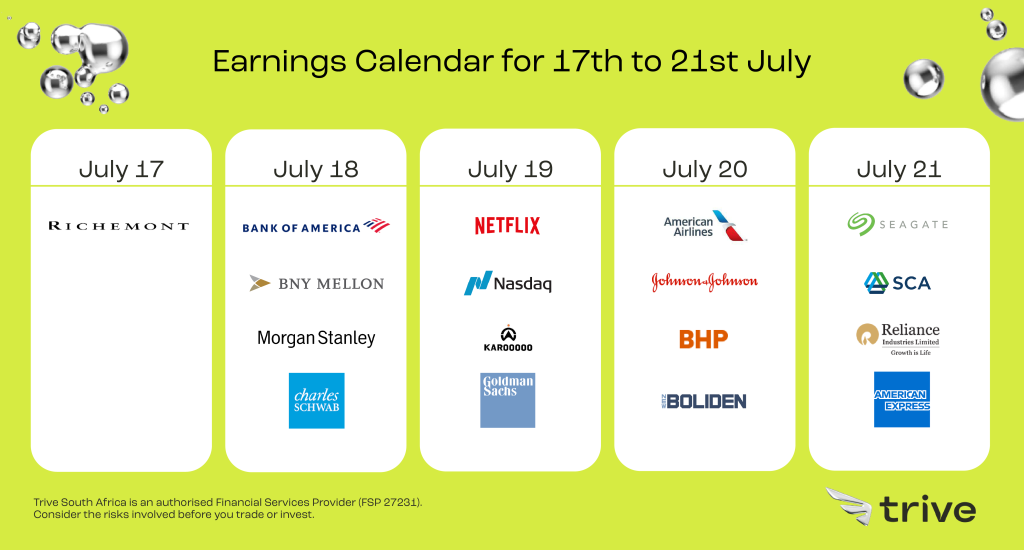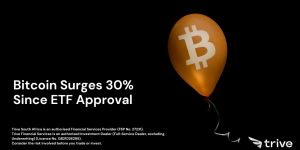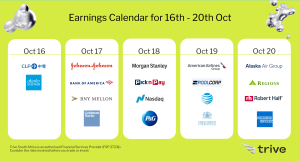
This week, the US earnings season kick-off, and companies such as Netflix and Goldman Sachs provide insights into their upcoming earnings.
Update 24 July
JPMorgan Chase & Co. (JPM US), Citigroup Inc. (C US), and Wells Fargo & Co. (WFC US) have all unveiled their results. Surpassing expectations, most of these banks exhibited robust performances, benefiting from a high interest rate environment due to the US Federal Reserve’s unwavering commitment to assertive rate hikes.
Bank of America Corp (NYSE: BAC)
In a display of financial prowess, Bank of America Corp. has proved its mettle, surpassing Wall Street’s expectations in the second quarter of 2023. The megabank’s stellar performance sent its stock soaring by over 4% on Tuesday, captivating investors and analysts alike. Reporting a 19% increase in earnings, Bank of America recorded $7.41 billion, or 88 cents per share, compared to $6.25 billion, or 73 cents per share, from the previous year. Fueling this surge was an 11% rise in revenue, reaching $25.33 billion. Of particular note was the bank’s net interest income, which witnessed a substantial 14% jump, soaring to $14.2 billion.
The road to success, however, hasn’t been without its challenges. Earlier predictions indicated that Bank of America would emerge as a top beneficiary of rising interest rates, propelling its profits to new heights. However, the unfolding reality has been more nuanced. Questions have surfaced around the company’s net interest income, a critical driver of a bank’s revenue, as loan and deposit growth witnessed a slowdown.
David Fanger, a distinguished analyst with Moody’s Investors Service, weighed in on the situation, affirming that Bank of America’s results did indeed benefit from higher interest rates. Nonetheless, as clients continue to seek higher yields, the bank’s net interest income finds itself under some pressure.
Netflix Inc (NSDQ: NFLX)
In a dazzling display of strategic innovation, Netflix has once again defied expectations, soaring to new heights in the latest quarter. The streaming giant reported revenue of $8.19 billion, a 3% increase from the prior-year period, while net income, climbed to $1.49 billion from $1.44 billion in the year-ago quarter, showcasing its unwavering ability to captivate audiences and redefine the entertainment landscape.
A significant driver of Netflix’s growth was the addition of a staggering 5.9 million subscribers during the quarter. This feat can be directly attributed to the success of the company’s two primary 2023 initiatives. Firstly, the crackdown on password sharing has not only reinforced the value of individual subscriptions but has also propelled new subscribers to join the ranks of the streaming empire. Secondly, the introduction of a more affordable $6.99 per month advertising tier has opened the doors to a whole new segment of viewers, broadening Netflix’s global reach and amplifying its impact.
In an audacious move, just ahead of the results announcement, Netflix strategically removed its lowest-priced ad-free streaming plan, known as the “Basic” plan, in the US. This tactical maneuver was executed to further drive interest and adoption of the new ad-supported tier, which is proving to be a resounding success both in the US and Canada.
South Africa’s Central Bank Takes a Pause
South Africa’s central bank made a significant move on Thursday, opting to halt interest rate hikes for the first time since November 2021. However, the message from Governor Lesetja Kganyago was clear: the pause in rate hikes does not signal the end of the hiking cycle, leaving the door open for future adjustments as economic conditions continue to evolve. The South African Reserve Bank’s (SARB) monetary policy committee (MPC) kept interest rates steady at 8.25%.
The MPC decision was not without internal debate, as the committee was divided in its views. While three members advocated for keeping rates unchanged, two members favored a 25 basis points hike. This split vote highlights the lingering concerns surrounding inflation and its potential impact on the economy in the future.
The latest official statistics revealed a notable slowdown in South African inflation, dropping to 5.4% in June. This decline brought inflation below the upper threshold of the bank’s target range of 3-6%, for the first time since April 2022.
As the country continues its journey towards economic recovery and stability, the South African central bank faces the delicate task of striking the right balance between controlling inflationary pressures and providing the necessary stimulus to foster growth.
Sources: SENS, Bloomberg, CNBC, MarketWatch, Financial Times
Disclaimer: Trive South Africa (Pty) Ltd, Registration number 2005/011130/07, and an Authorised Financial Services Provider in terms of the Financial Advisory and Intermediary Services Act 2002 (FSP No. 27231). Any analysis/data/opinion contained herein are for informational purposes only and should not be considered advice or a recommendation to invest in any security. The content herein was created using proprietary strategies based on parameters that may include price, time, economic events, liquidity, risk, and macro and cyclical analysis. Securities involve a degree of risk and are volatile instruments. Market and economic conditions are subject to sudden change which may have a material impact on the outcome of financial instruments and may not be suitable for all investors. When trading or investing in securities or alternative products, the value of the product can increase or decrease meaning your investment can increase or decrease in value. Past performance is not an indication of future performance. Trive South Africa (Pty) Ltd, and its employees assume no liability for any loss or damage (direct, indirect, consequential, or inconsequential) that may be suffered from using or relying on the information contained herein. Please consider the risks involved before you trade or invest.




